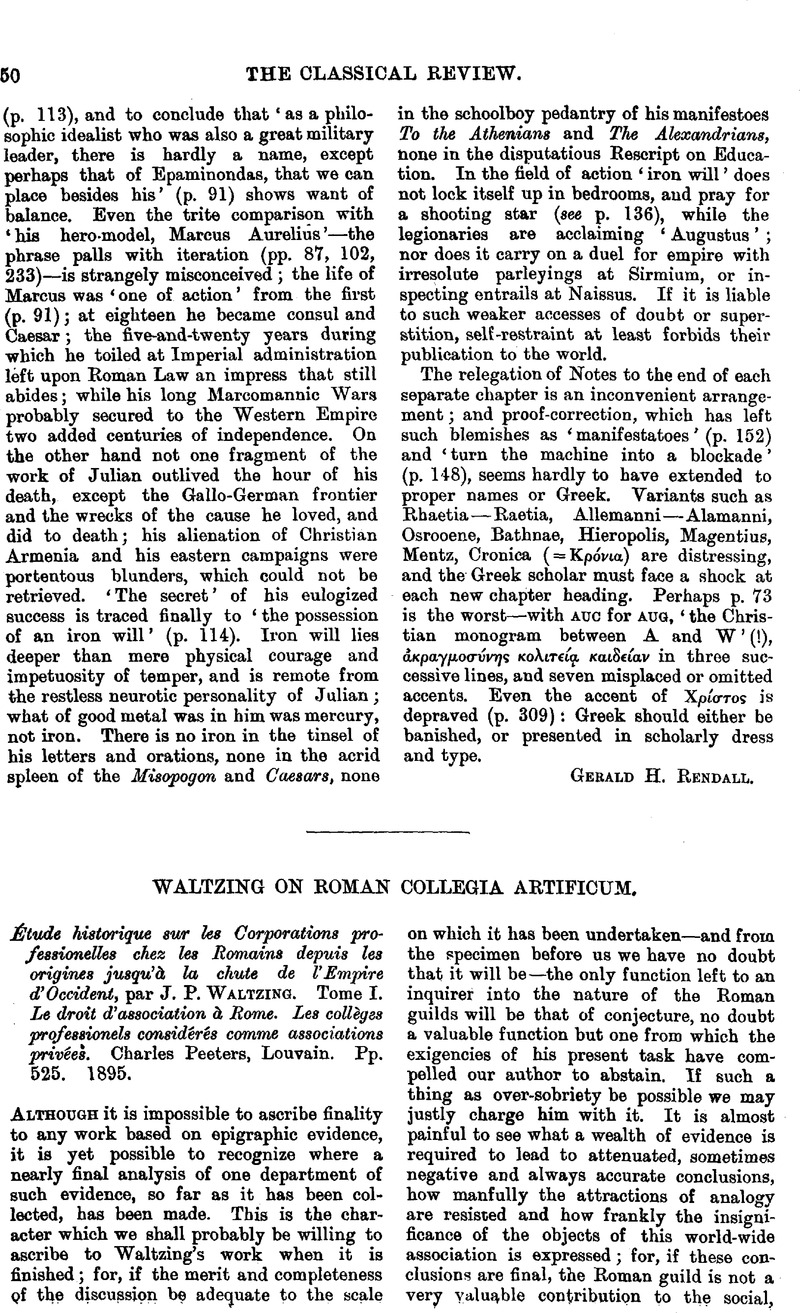No CrossRef data available.
Published online by Cambridge University Press: 27 October 2009

page 51 note 1 Gains ad leg. xii. Tab. (Dig. 47, 22, 4), ‘sodales sunt, qui ejusdem collegii sunt—his autem potesfatem facit lex pactionem quam velint sibi ferre, dum ne quid ex publicalege corrumpant.’
page 52 note 1 Basilica 60, 32.β′ιδ παρ⋯νομον ποι⋯ν σ⋯στηματῇ κατ⋯ τ⋯ν σὺν ⋯πλοις δημ⋯σιον ἣ ἱερ⋯ν κατα![]()
![]()
page 52 note 2 Tac. Ann. 14, 17, ‘prohibiti publice in decomannos ejus modi coetu Pompeiani collegiaque, quae contra leges institucrant, dissoluta; Livineius et qui alii seditionem conciverant exiliomultati sunt.’
page 52 note 3 Kaput ex S. C. populi Romani. Quibus coire convenire collegiumque habere liceat. Qui stipem menstruam conferre volent in funera, in it collegium coeant’ (Brun's Fonte 5 p. 315); Marcian in Dig. 47, 22, 1.
page 52 note 4 Marcian in Dig. I.e. ‘ sed religionis causa coire non prohibentur, dum tamen per hoc non fiat contra senatus consultum, quo collegia illicita arcentur.’ In the Basilica (60, 32) κα⋯ χ⋯ριν εὐχ⋯ς θεμιτ⋯ς ἔξεστι σινι⋯ναι is made a distinct regulation, applicable to ‘ collegia ’ in general.
page 54 note 1 Tertullian (Apol. 39) ‘ Nam inde non epulis nee potaculis nee ingratis voratrinis (as in the pagan colleges) sed egenis alendis humandisque,’ and other charitable objects. ‘ Alere ’ is here put side by side with ‘ humare ’ which was an object of the pagan guilds.
page 54 note 2 Dio Cass. 38, 13. κα⋯ τ⋯ ⋯ταιρικ⋯ κολλ⋯για ⋯πιhi;ωρ⋯ως καλο⋯μενα, ὔντα μ⋯ν ⋯κ το⋯ ⋯ρχα⋯ου, καταλυθ⋯ντα δ⋯ χρ⋯νον τιν⋯ ⋯νανεώσατο
page 54 note 3 Ascon, . in Pison. pp. 6 and 7Google Scholar (Kiessling and Schbll) ‘solebant autem magistri collegiorum ludos facere, sicut magistri vicorum faciebant, compitalicios praetextati, qui ludi sublatis collegiis discussisunt.’ Cf. Cic. in Pis. 4, 8.
page 54 note 4 Cic. pro Sest. 15, 34.
page 54 note 5 When the ‘ sodalitates ’ and ‘ decuriati’ were dissolved in 56 a law was necessary, ‘ lexque de iis ferretur ut qui non discessissent ea poena, quae est devi, tenerentur’ (Cic. ad. Q. fr. 2, 3, 5). The ‘decuriati’ were probably electioneering associations. For the abolition of the ‘ collegia ’ in 64 a senatus consultum alone seems to hav sufficed.